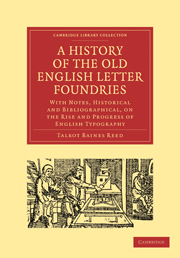 A History of the Old English Letter Foundries
A History of the Old English Letter Foundries Book contents
- Frontmatter
- PREFACE
- Contents
- LIST OF ILLUSTRATIONS
- Introductory Chapter: THE TYPES AND TYPE FOUNDING OF THE FIRST PRINTERS
- Chap. 1 THE ENGLISH TYPE BODIES AND FACES
- Chap. 2 THE LEARNED, FOREIGN AND PECULIAR CHARACTERS
- Chap. 3 THE PRINTER LETTER-FOUNDERS, FROM CAXTON TO DAY
- Chap. 4 LETTER FOUNDING AS AN ENGLISH MECHANICAL TRADE
- Chap. 5 THE STATE CONTROL OF ENGLISH LETTER FOUNDING
- Chap. 6 THE OXFORD UNIVERSITY FOUNDRY
- Chap. 7 THE STAR CHAMBER FOUNDERS, AND THE LONDON POLYGLOT
- Chap. 8 JOSEPH MOXON
- Chap. 9 THE LATER FOUNDERS OF THE 17TH CENTURY
- Chap. 10 THOMAS AND JOHN JAMES
- Chap. 11 WILLIAM CASLON
- Chap. 12 ALEXANDER WILSON
- Chap. 13 JOHN BASKERVILLE
- Chap. 14 THOMAS COTTRELL
- Chap. 15 JOSEPH AND EDMUND FRY
- Chap. 16 JOSEPH JACKSON
- Chap. 17 WILLIAM MARTIN
- Chap. 18 VINCENT FIGGINS
- Chap. 19 THE MINOR FOUNDERS OF THE 18TH CENTURY
- Chap. 20 WILLIAM MILLER
- Chap. 21 THE MINOR FOUNDERS FROM 1800 TO 1830
- CHRONOLOGICAL TABLE OF ENGLISH LETTER-FOUNDERS' SPECIMENS NOTED IN THIS WORK 1665–1830
- LIST OF THE PRINCIPAL AUTHORITIES CONSULTED OR REFERRED TO
- INDEX
- Plate section
Chap. 17 - WILLIAM MARTIN
Published online by Cambridge University Press: 05 August 2011
- Frontmatter
- PREFACE
- Contents
- LIST OF ILLUSTRATIONS
- Introductory Chapter: THE TYPES AND TYPE FOUNDING OF THE FIRST PRINTERS
- Chap. 1 THE ENGLISH TYPE BODIES AND FACES
- Chap. 2 THE LEARNED, FOREIGN AND PECULIAR CHARACTERS
- Chap. 3 THE PRINTER LETTER-FOUNDERS, FROM CAXTON TO DAY
- Chap. 4 LETTER FOUNDING AS AN ENGLISH MECHANICAL TRADE
- Chap. 5 THE STATE CONTROL OF ENGLISH LETTER FOUNDING
- Chap. 6 THE OXFORD UNIVERSITY FOUNDRY
- Chap. 7 THE STAR CHAMBER FOUNDERS, AND THE LONDON POLYGLOT
- Chap. 8 JOSEPH MOXON
- Chap. 9 THE LATER FOUNDERS OF THE 17TH CENTURY
- Chap. 10 THOMAS AND JOHN JAMES
- Chap. 11 WILLIAM CASLON
- Chap. 12 ALEXANDER WILSON
- Chap. 13 JOHN BASKERVILLE
- Chap. 14 THOMAS COTTRELL
- Chap. 15 JOSEPH AND EDMUND FRY
- Chap. 16 JOSEPH JACKSON
- Chap. 17 WILLIAM MARTIN
- Chap. 18 VINCENT FIGGINS
- Chap. 19 THE MINOR FOUNDERS OF THE 18TH CENTURY
- Chap. 20 WILLIAM MILLER
- Chap. 21 THE MINOR FOUNDERS FROM 1800 TO 1830
- CHRONOLOGICAL TABLE OF ENGLISH LETTER-FOUNDERS' SPECIMENS NOTED IN THIS WORK 1665–1830
- LIST OF THE PRINCIPAL AUTHORITIES CONSULTED OR REFERRED TO
- INDEX
- Plate section
Summary
William martin was brother to Robert Martin, Baskerville's apprentice and successor. He appears to have acquired his first knowledge of the art at the Birmingham foundry, and about the year 1786 to have come to London and entered into the service of Mr. George Nicol, as a punch cutter. Mr. Nicol was at that time engaged in maturing his plans for the production of a magnificent edition of Shakespeare, and kept Martin at his own house “to cut sets of types after approved models in imitation of the sharp and fine letter used by the French and Italian printers.”
On the establishment of the famous “Shakespeare Press,” by Messrs. Boydell and Nicol, in 1790, at Cleveland Row, St. James's, with William Bulmer as presiding genius, Martin was established in premises hard by, in Duke Street; his foundry being a sort of private foundry in connection with the Press. Here it was that he produced the founts in which the magnificent works, issued during the next twenty years from Bulmer's Press, were printed.
The appearance of the first part of the Shakespeare in 1791 at once established the fame of the printer and his types; and the completion of the work, in nine volumes, in 1810, may be regarded as marking an epoch in British typography. “No work of equal magnitude”, says the enthusiastic Dibdin, “ever presented such complete accuracy and uniform excellence of execution.
- Type
- Chapter
- Information
- A History of the Old English Letter FoundriesWith Notes, Historical and Bibliographical, on the Rise and Progress of English Typography, pp. 330 - 334Publisher: Cambridge University PressPrint publication year: 2010First published in: 1887
